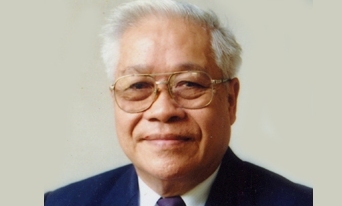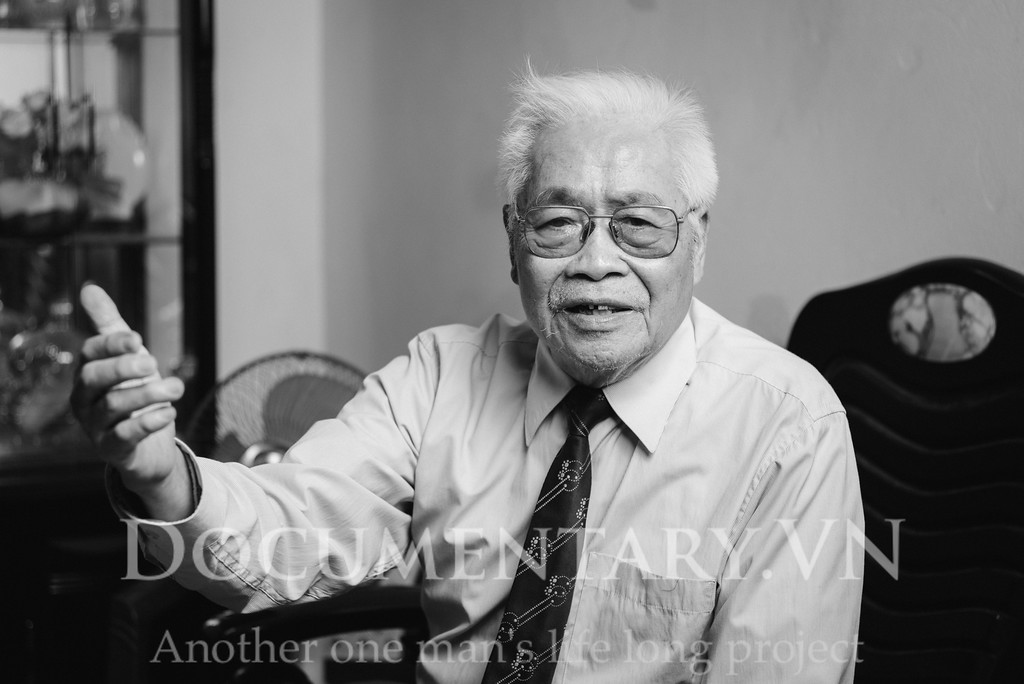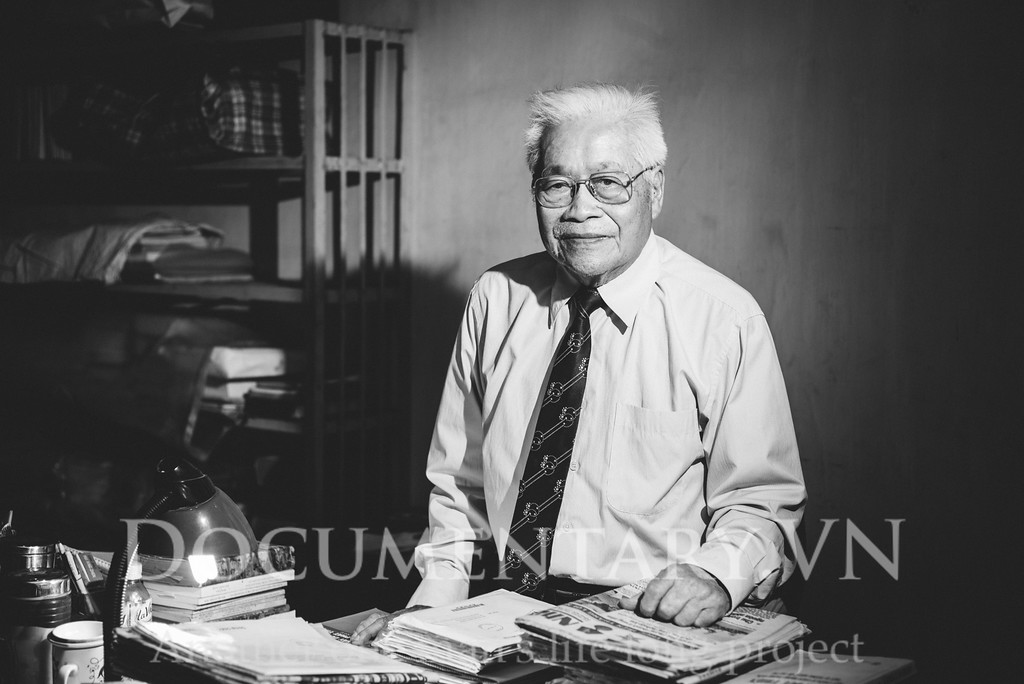
Professor Pham Nhu Cuong was born in 1928 in Thuong Truy, Nam Kinh commune, Nam Dan district, a renowned scholarly region that has produced many talented individuals for the country. His hometown is known for its cotton cultivation, weaving, and traditional folk singing, as well as for dishes like "canh dat" (a type of small clam) and "banh trang kep ke" (rice paper rolls with millet and other ingredients), which he loved since childhood. His upright character, disregard for fame and fortune, and the studious spirit of overcoming difficulties, characteristic of the people of Nghe An province, deeply ingrained in him and became a distinctive trait, as expressed in a poem that Dr. Nguyen Lan Cuong, son of Professor Nguyen Lan, dedicated to him on his 70th birthday:
"I can never forget my teacher, a man of integrity."
As the teacher's name – the name given by the parents.
Seventy years – a fleeting moment!
No shame for the days lived.
His life was a vibrant tapestry.
"Leaving indelible marks on me..."
In his youth, living amidst the fervent revolutionary struggle, although he had no direct contact with the revolution, what he saw and heard in daily life reminded young Cuong of the plight of a people who had lost their country. The education he received in the French-Vietnamese school also instilled in him a deep awareness of freedom and democracy. He hated the oppression and harassment of the official class in society and dreamed of pursuing a free profession rather than being a bureaucrat."Going to work early in the morning with an umbrella, and coming home with an umbrella in the evening."under the protectorate regime or the governing apparatus of the Southern Dynasty.

Professor Pham Nhu Cuong - Head of the Philosophy Department (Hanoi University) (1980 – 1987)
In 1944, after graduating from Hue National High School, he went to Hanoi to study at Van Lang School. While traveling by boat from Tuyen Quang to Hanoi, upon reaching Doan Hung, a Viet Minh propaganda team boarded the boat to distribute leaflets and call on people to join the national salvation movement. What strongly impressed the young Pham Nhu Cuong was a young woman of the Tho (now called Tay) ethnic group in the team, wearing a dark blue shirt, black tight-fitting trousers, and carrying a Sten submachine gun on her shoulder, acting as a support and protector for the team. He felt ashamed, realizing that he, a well-educated young man, was inferior to a young woman of the ethnic minority. The thought of finding the Viet Minh became even stronger in his resolve.
He tried to persuade his friends to join him in searching for the Viet Minh, but no one dared. Alone, he sought out his former elementary school teacher, the head of the Viet Minh in Anh Son district, his hometown, and expressed his desire, asking for his help. Very quickly, he was arranged to participate in youth and student activities. His first memorable experience in his revolutionary life was being assigned as a Viet Minh speaker at a public rally attended by several hundred people at the Do Luong stadium. That day, relying on the strong momentum of the Self-Defense organization and the masses, he calmly and skillfully dealt with a group of Japanese soldiers who threatened to disrupt the rally. It can be considered that he successfully overcame the first challenge in his revolutionary life.
After the August Revolution of 1945, Pham Nhu Cuong fled his home to join the army. Throughout eight years of intense fighting (1946-1954), he fought on the most brutal battlefields of Quang Tri province. He held many important positions in the army, such as Head of the Political Department of the Binh Tri Thien Front, Deputy Head of the Political Department of the 325th Division, and then crossed the treacherous Truong Son Mountains to become Deputy Head of the Political Department of the Central Laos Front. Those years were brutal but beautiful. He was tempered and matured through combat and work, and was close to many courageous and strategic generals and officers such as Nguyen Son, Le Thiet Hung, Tran Van Quang, Tran Quy Hai, Ha Van Lau, Tran Sam, Hoang Sam, Le Nam Thang… During this time, he was exposed to the classic works of Marxism-Leninism:The Communist Manifesto, Imperialism - The Highest Stage of Capitalism...he began to explore, search for, and research these theories, even though his political understanding at the time did not allow him to deeply comprehend them.
In 1954, a significant turning point came in Pham Nhu Cuong's life. He was included in the list of mid- and high-ranking cadres from within and outside the military sent by the Central Committee to study Marxism-Leninism at the Advanced Party School of the Communist Party of China. This marked the beginning of a new phase in his theoretical journey. He was officially selected by the Party to be trained as a Marxist theorist. For the first time, he was systematically exposed to Marxist-Leninist philosophical viewpoints, Marxist-Leninist political economy, Party building, and the experiences of the Communist Party of the Soviet Union and the Communist Party of China.
In 1956, he returned to Vietnam amidst a highly complex political situation. Following mistakes in land reform and organizational restructuring, the Party began to correct its errors. This reality created an urgent need to raise the theoretical level of cadres and Party members. The Party decided to shift the focus of study at the Nguyen Ai Quoc Party School from primarily studying Party guidelines and policies to systematically studying the fundamental subjects of Marxism-Leninism. To form a core group of cadres for these new subjects, along with many other comrades, Pham Nhu Cuong was transferred to the Philosophy Department of the Nguyen Ai Quoc Advanced Party School. He officially participated in research and teaching of theory. For the first two courses, to gain experience, he worked as an assistant lecturer for experts from the Soviet Union and China.
In 1960, while serving as Head of the Philosophy Department at the Nguyen Ai Quoc Higher Party School, he was sent to further his education at the Soviet Union's Higher Party School. This was a cradle with a long tradition of training and fostering Marxism-Leninism. Listening to the lectures..."Go with the flow"After hearing some Russian professors' lectures translated into French, he felt for the first time that he couldn't completely trust them. Not everything they taught was true."An eternal truth."
Upon returning to Vietnam in May 1964, Pham Nhu Cuong received a decision from the Central Party Secretariat appointing him Director of the Institute of Philosophy at the young age of 36. This heavy responsibility caused him anxiety and worry, especially since philosophy was still a very new field at the time. The Institute of Philosophy was also facing many complex issues regarding ideological work and personnel. Some key officials of the Institute endorsed Khrushchev's revisionist views, thereby criticizing the attitude and viewpoints of our Party in the intense Sino-Soviet debate that was taking place at the time.

In a situation marked by deep divisions in viewpoints and policies within the international communist movement and internal reflections within our Party, Pham Nhu Cuong's responsibility at that time was to change the Institute's political orientation, ensuring that the Institute of Philosophy remained a reliable base for the Party in the field of ideology and theory. How could he stabilize the staff's thinking, unite the institution, and propose a new work program to engage them in the work? Writing about this difficult period, the bookInstitute of Philosophy: 35 Years of Development and GrowthPublished in 1997, review:"In the complex situation at that time, with his cautious, objective, and loyal attitude, Comrade Pham Nhu Cuong united the entire Institute, gradually stabilizing it and leading it to focus on various research topics… The greatest lesson of the 1964-1975 period was: taking the Party's ideology as the foundation, using the completion of professional tasks as the binding force, both uniting and fighting… And to achieve the above, the cautious, objective, tolerant, and courageous attitude of the head of the institution and the attitude of all cadres who knew how to overcome narrow-minded prejudices and personal insecurities to cooperate with each other in the common cause were of decisive importance."
During his time at the Institute of Philosophy, in addition to his administrative duties, Professor Pham Nhu Cuong delved into scientific research in the fields of dialectical materialism, historical materialism, the struggle against bourgeois ideology, and the neo-colonial culture of South Vietnam. He also participated in the Subcommittee on Political Issues of the Central Theoretical Committee, where he was assigned to write about the theory of the transitional period to socialism in Vietnam.
In the 1970s, the country had a system of teaching and training institutions for Marxist-Leninist ideology, with the Nguyen Ai Quoc Advanced Party School as the core. Several universities and colleges also had departments of Marxist-Leninist ideology, including the Department of Philosophy. The rapid development of science and the intellectual workforce in our country at that time created a need for formal university-level training in Marxist-Leninist disciplines. In September 1976, the Central Party Secretariat decided to establish the Departments of Philosophy, Political Economy, and Law at Hanoi University. The directors of the Institutes of Philosophy, Political Economy, and Law under the Social Sciences Committee were appointed as concurrent heads of the respective departments. This stemmed from the view of closely integrating teaching with research, unifying the organization of teaching and research. (Professor...) Pham Nhu Cuong, who was then the Director of the Institute of Philosophy, was appointed Head of the Philosophy Department at Hanoi University.
The establishment of the Philosophy Department faced many difficulties in its early stages. The facilities were poor, and the staff had to be reorganized by transferring teachers from the Institute and other departments. His main work at the Institute of Philosophy, along with his concurrent duties at several other units, kept him constantly busy. Recalling those days, Professor Pham Nhu Cuong still silently thanks those who dedicated their time and effort to helping him lay the first bricks for the Philosophy Department: Duong Phu Hiep, Nguyen Quang Thong, Nguyen Huu Vui, Nguyen Dinh Xuan, Nguyen Anh Lich… They worked enthusiastically and wholeheartedly, partly because they felt the importance and honor of being among the first to contribute to the creation of a new, formal training program at a prestigious university at that time. Partly because they trust and admire their leader, the head of the department, who is reputable in his field, has extensive experience in management and organization, is wholeheartedly dedicated to the common good, lives honestly, and is kind to everyone around him.
Although nominally the Head of the Faculty until 1988, Professor Pham Nhu Cuong had been appointed as Vice Chairman of the Social Sciences Committee since 1978. In 1981, he was appointed Deputy Head of the Central Committee's Science and Education Department, in charge of social sciences. In 1985, he was appointed Chairman of the Social Sciences Committee. His heavy workload meant he had limited time for the Faculty. The work of the Faculty was mainly handled by the Vice Chairmen and other faculty members at the time.
To date, after nearly 40 years of establishment and development, the Faculty has made significant progress. Many of its students have contributed to the ranks of staff working in propaganda, research, and teaching Philosophy at research institutes, universities, and many other agencies. Many have matured and taken on key positions at the central level and in various units. New specializations have been opened, and the number of undergraduate, graduate, and doctoral students is constantly increasing. The Faculty of Philosophy has also been the cradle for the emergence of many other specializations such as Psychology, Sociology, and Management Science. At the 30th anniversary conference of the Faculty of Philosophy, University of Social Sciences and Humanities, Vietnam National University, Hanoi in 2006, Professor Pham Nhu Cuong attended, sharing his joy and celebrating the Faculty's growth and prestige. One issue he raised at the conference, which was widely agreed upon by scientists and also a major concern of his after nearly 50 years of philosophical research, is the need to change the way philosophy is taught to help students acquire a correct method of thinking so that they can think proactively, independently, and creatively. The product of philosophy education should not only be people capable of research, but also capable of thinking to produce new philosophical arguments, theories, and schools of thought, forming the basis and worldview for the development of the social sciences and humanities in particular, and for the development direction of the nation and the country in general.
Professor Pham Nhu Cuong held many important positions: Vice Chairman and then Chairman of the Vietnam Social Science Committee, Member of Parliament, and then Member of the Central Committee of the Communist Party of Vietnam. He chaired and participated in many domestic and international seminars and conferences, and visited and lectured at many universities in India, Japan, the United States, Thailand, etc. Despite his busy administrative work, he remained diligent in scientific research. He is the author, co-author, and editor of 10 books, 4 of which were published in Moscow. Some notable books include:Contributing to the renewal of understanding of socialism.(1993)The dissemination of Marxism-Leninism in Vietnam(1993)Criticism of the ideology and politics of neocolonialism.(1984)Economic problems of the transition to socialism in economically underdeveloped countries. (1986)Philosophy – Natural Sciences – Scientific and Technological Revolution(1987), Innovating thinking styles(1999).
He also participated in the implementation of many key national-level projects such as:Regarding the Soviet model of socialism under Stalin(1994 - 1995)The concept of socialism in Vietnam before the Doi Moi (Renovation) period.(1994 - 1995)Stalin's practice and theory on the question of the socialist state.(1993 - 1994)Lenin's New Economic Policy and its application to reforms in our country. (1996), Renewing understanding of the historical development of Marxist theory(1996).
According to him, scientists must diligently enrich their knowledge by reading books, which are repositories of human knowledge contained in the words and writings of their predecessors. Doing science requires independent thinking and a focus on creativity and the discovery of objective truth. He often cherishes a quote by Friedrich Engels that he particularly appreciates:"The history of science is the history of the gradual elimination of stupidity… or the replacement of that stupidity with new, increasingly less absurd stupidity."And throughout his life and career, he wholeheartedly lived, worked, and dedicated himself to that truth.
|
PROFESSOR PHAM NHU CUONG
+ Workplace: Department of Philosophy (Hanoi University). + Management position: Director of the Institute of Philosophy under the Committee for Social Sciences (1964 - 1981). Head of the Philosophy Department (Hanoi University) (1980 – 1987). Deputy Chairman of the Social Sciences Committee (1978 - 1981). Deputy Head of the Central Committee's Science and Education Department (1981 - 1985). Chairman of the Social Sciences Committee (1985 - 1990). Chairman of the National Council for the Compilation of the Vietnamese Encyclopedia (1987). Alternate member of the Central Committee of the Party, 6th term; Member of the National Assembly, 8th term.
Contributing to the renewal of understanding of socialism.(1993). The dissemination of Marxism-Leninism in Vietnam(1993). Critique of the ideology and politics of neocolonialism(1984). Economic problems of the transition to socialism in economically underdeveloped countries.(1986). Philosophy – Natural Sciences – Scientific and Technological Revolution (1987). Innovate your thinking style.(1999). |
Author:Le Thanh Ha